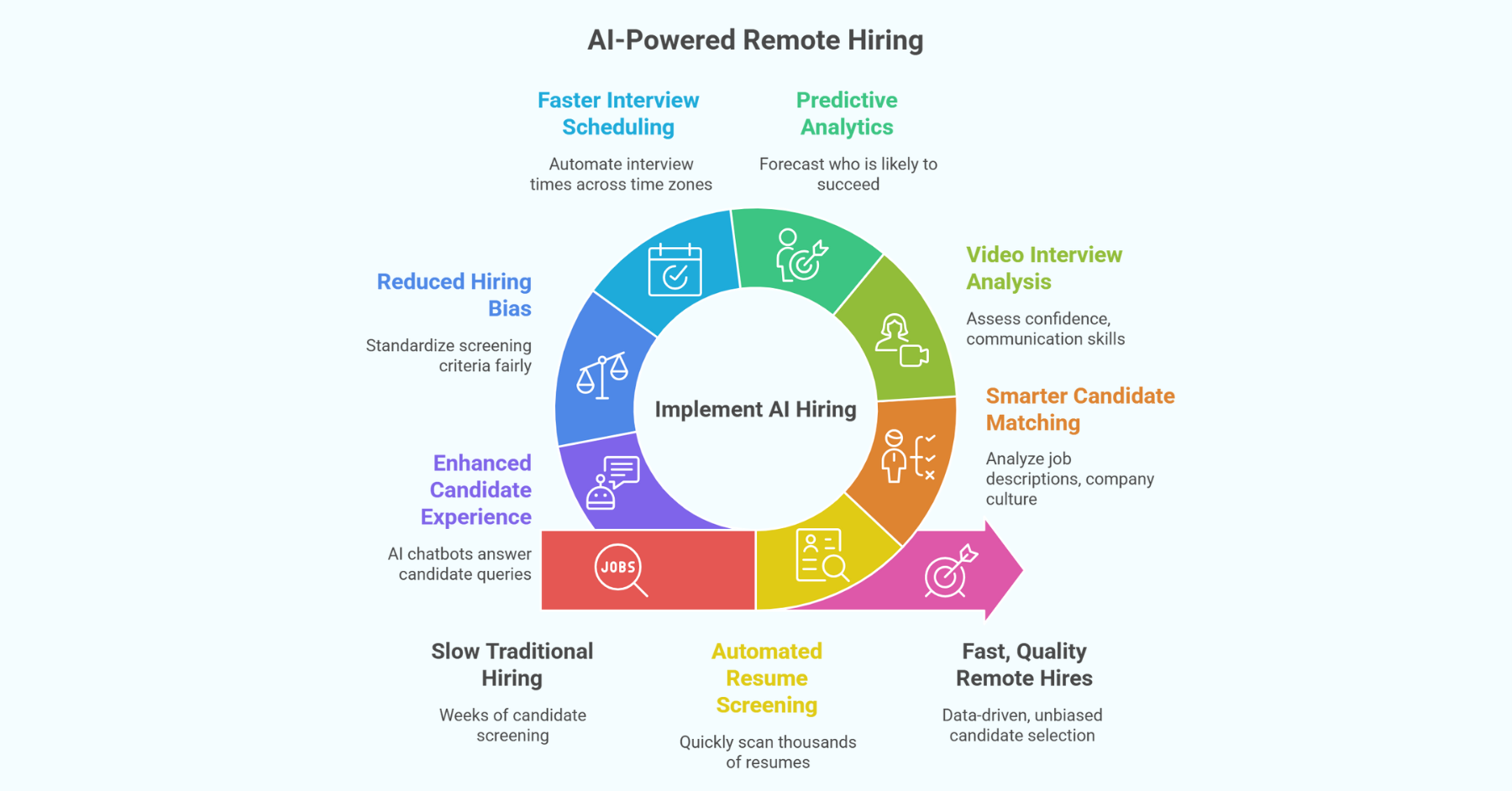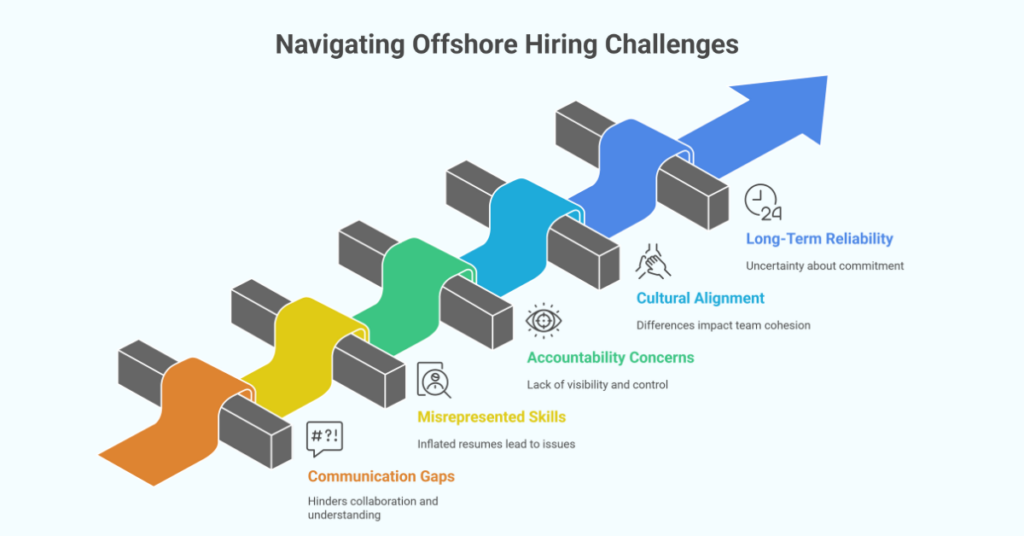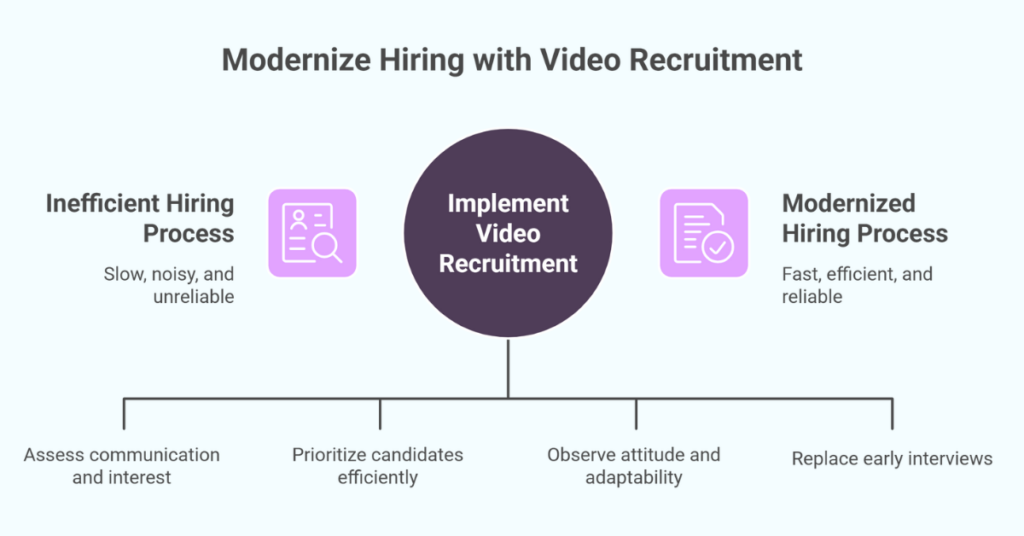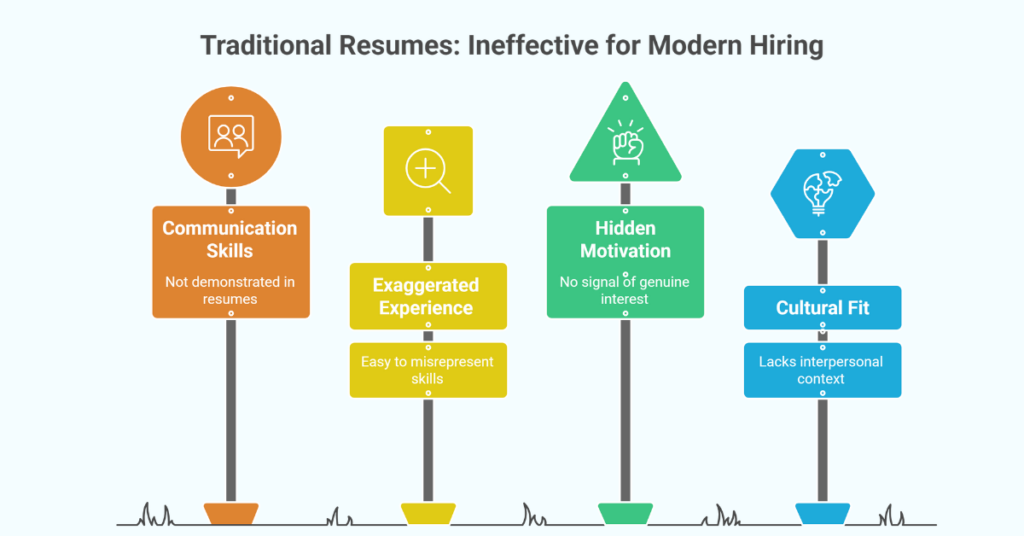AI-Powered Remote Hiring is transforming the way businesses connect with top talent by reducing time-to-hire and improving candidate quality across the globe.
Recruitment has entered a new era with the rise of artificial intelligence. Traditional hiring methods often required weeks of candidate screening, scheduling, and interviews, which slowed down the hiring process and made it harder for companies to secure top talent before competitors. In today’s global market, businesses need faster and smarter ways to connect with the right professionals. AI-Powered Remote Hiring bridges that gap by streamlining repetitive tasks, improving candidate matching, and providing insights that human recruiters might miss.
This approach is not just about speed. It also improves the quality of hires by leveraging data-driven decision-making. From resume parsing to intelligent interview scheduling and predictive candidate scoring, AI is reshaping how companies hire talent remotely. Employers can reduce human error, minimize bias, and ensure they select the best candidate for each role. For job seekers, AI ensures fairer assessments and smoother application processes.
In this article, we will explore seven practical ways AI-Powered Remote Hiring is helping companies save time and improve hiring quality, while also enhancing the candidate experience and ensuring businesses remain competitive in the fast-changing talent market.
1) Automated Resume Screening
AI recruitment tools can quickly scan thousands of resumes, filtering candidates based on skills, qualifications, and experience. This eliminates the time recruiters spend manually sorting through applications.
By using natural language processing, AI identifies relevant keywords and context in resumes rather than just matching job descriptions word-for-word. This improves accuracy in shortlisting candidates who are genuinely qualified. For employers, this means reducing the time to create a shortlist and avoiding missed opportunities. For candidates, it ensures their applications are assessed fairly and consistently.
2) Smarter Candidate Matching
AI hiring solutions go beyond keyword matching by analyzing job descriptions, company culture, and candidate profiles. The system ranks candidates not only on technical fit but also on soft skills and potential cultural alignment.
This data-driven approach ensures that employers get candidates who are more likely to succeed long-term. For remote hiring, this is especially critical since companies often recruit from global talent pools where cultural alignment is harder to assess manually. Smarter matching improves retention rates and reduces the cost of wrong hires.
3) Video Interview Analysis
AI-enabled video interviews can analyze speech patterns, tone, and even facial expressions to assess confidence, communication skills, and suitability for a role. This allows employers to evaluate more than what is written on a resume.
The benefit here is two-fold: recruiters save time by automating initial screenings, and candidates get a chance to demonstrate their personality and soft skills early. Video analysis is particularly useful for remote hiring since in-person interactions are limited. Employers can focus on candidates who not only meet technical requirements but also display strong interpersonal capabilities.
4) Predictive Analytics for Hiring Success
Predictive analytics uses past hiring data, performance outcomes, and candidate attributes to forecast who is likely to succeed in a role. This approach significantly reduces guesswork in hiring decisions.
For example, AI may highlight that candidates with certain educational backgrounds, certifications, or project experiences perform better in specific roles. This empowers employers to make smarter decisions backed by data. Predictive hiring reduces turnover and ensures companies build stronger teams from the start.
5) Faster Interview Scheduling
AI-powered scheduling assistants can automatically coordinate interview times between candidates and hiring managers across different time zones. This saves hours of back-and-forth communication.
For remote hiring, where candidates often live in different countries, this automation ensures faster and smoother interview processes. It also creates a better experience for job seekers, who get prompt scheduling updates and reminders. By reducing delays in interview coordination, companies cut down the time-to-hire significantly.
6) Reduced Hiring Bias
One of the most powerful benefits of AI in recruitment is its ability to reduce unconscious bias. Traditional hiring processes can unintentionally favor certain demographics, while AI tools evaluate candidates purely on qualifications and fit.
Although no system is entirely bias-free, AI significantly lowers the influence of subjective factors by standardizing screening criteria. This helps companies build more diverse teams and ensures that talent is judged fairly, regardless of background. For job seekers, this means equal opportunities in landing remote roles.
7) Enhanced Candidate Experience
AI chatbots and virtual assistants can answer candidate queries, provide application status updates, and guide applicants through the recruitment journey. This enhances the candidate experience and keeps job seekers engaged.
A positive hiring experience matters because it reflects on the employer brand. Candidates who feel supported during the process are more likely to accept offers and recommend the company to others. For employers, this translates to higher offer acceptance rates and stronger reputation in the market.
Remote Recruit Solutions for Employers and Job Seekers
Remote Recruit is built to make AI-Powered Remote Hiring accessible and effective for both employers and job seekers. Employers benefit from intelligent screening, candidate matching, and automated interview coordination, ensuring faster hires without sacrificing quality. They can access a global talent pool with tools designed to reduce hiring costs and improve decision-making accuracy.
For job seekers, Remote Recruit offers fair and transparent hiring processes powered by AI. From video-based applications to skill assessments, candidates have more opportunities to showcase their capabilities beyond traditional resumes. AI-driven support also ensures applicants get timely feedback and guidance throughout their hiring journey.
By combining human expertise with AI recruitment tools, Remote Recruit creates a balanced ecosystem where businesses hire smarter and professionals land opportunities that fit their skills and career goals.
Conclusion
AI-Powered Remote Hiring is no longer just a trend but a necessity for businesses aiming to compete in a global, digital-first market. By automating repetitive tasks, improving candidate matching, and applying predictive analytics, companies can hire faster and with greater accuracy. Employers benefit from reduced costs, lower turnover rates, and stronger teams, while job seekers enjoy fairer evaluations and smoother application processes.
Adopting AI in recruitment also helps companies overcome challenges such as time zone differences, skill shortages, and unconscious bias. The ability to assess candidates through video, manage scheduling seamlessly, and rely on data-driven decisions gives businesses a distinct edge.
For organizations serious about building high-performing remote teams, leveraging AI recruitment tools is one of the smartest strategies available. As the hiring landscape continues to evolve, companies that invest in AI-powered systems will be the ones that secure the best talent quickly and consistently.
Sign up with Remote Recruit today and experience how AI-Powered Remote Hiring can simplify your process, cut costs, and connect you with world-class talent.
Frequently Asked Questions
1. What is AI-Powered Remote Hiring?
AI-Powered Remote Hiring uses artificial intelligence tools to automate resume screening, candidate matching, interview scheduling, and predictive analytics, helping companies hire faster and more effectively.
2. How does AI improve the quality of hires?
AI analyzes skills, experience, and cultural fit to recommend candidates most likely to succeed in a role. This reduces poor hiring decisions and improves employee retention rates.
3. Can AI reduce bias in recruitment?
Yes. AI standardizes evaluation criteria, focusing on skills and qualifications instead of subjective factors. While not completely bias-free, it minimizes unconscious bias in hiring decisions.
4. Why is AI important for remote hiring?
Remote hiring often involves global talent pools and time zone differences. AI streamlines processes like scheduling, screening, and communication, making remote hiring faster and more efficient.
5. How does Remote Recruit use AI in hiring?
Remote Recruit combines AI recruitment tools with expert oversight to deliver accurate candidate matching, automated processes, and a fair experience for both employers and job seekers.
